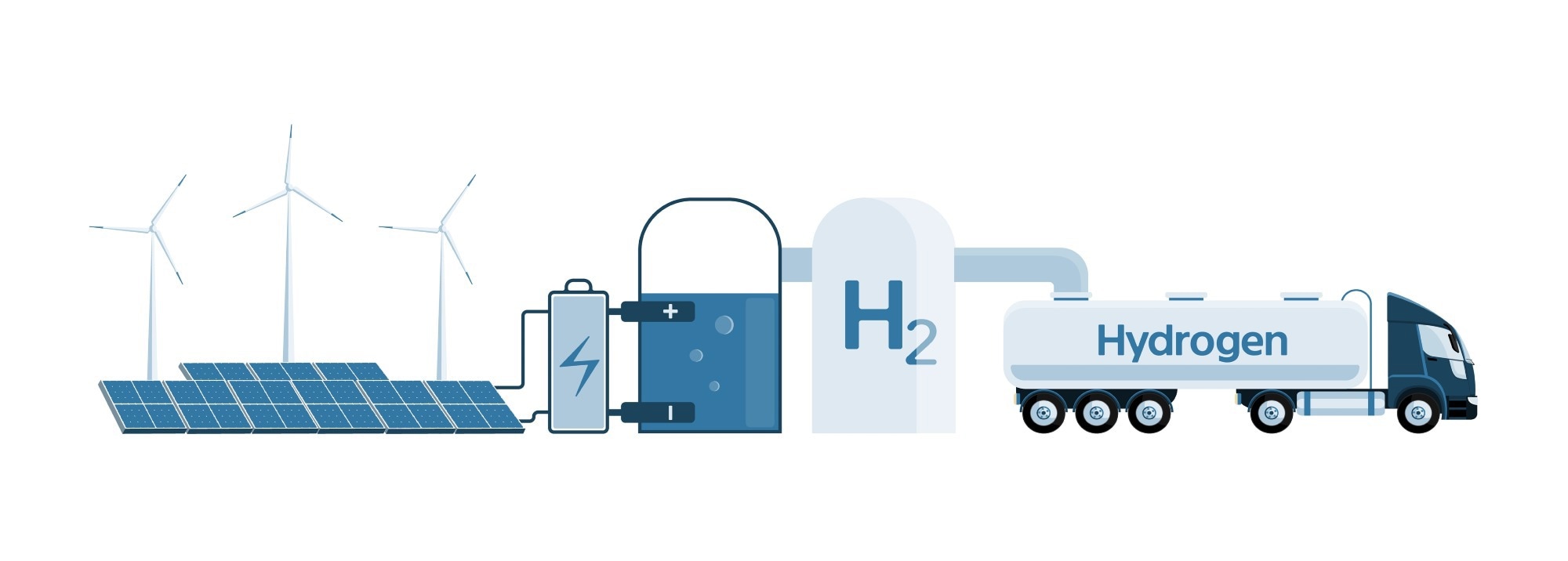The global energy market is more volatile and uncertain than ever. Compounded with the challenges around climate change, it is evident that secure, sustainable, and affordable energy supplies are needed to meet future energy demands. With hydrogen dominating the discussions around clean energy transitions in recent years, it prompts the question: does it truly have the potential to deliver?

Image Credit: Scharfsinn/Shutterstock.com
The Colors of Hydrogen
Hydrogen can be produced from many routes, each classified by a different color. Of the many colors, the most commonly discussed are green, blue, grey, and brown.
Green hydrogen is the most sustainable form of hydrogen as it is produced from electrolysis powered by renewable energy technologies. It differs from blue hydrogen, which is made from natural gas and its carbon emissions are captured, stored, or reused. Hydrogen produced from natural gas or methane via steam methane reformation without the capture of emissions is grey hydrogen. Brown hydrogen is produced from thermal coal and is the cheapest to manufacture.
Almost 80% of all hydrogen is produced from emission-intensive routes such as coal gasification and natural gas reforming. With the demand for hydrogen increasing in recent years, more effort is needed to reduce the emissions associated with hydrogen production. Governments worldwide are adopting hydrogen strategies to ensure that focus is placed on low-carbon hydrogen technologies.
How Does Green Hydrogen Energy Storage Work?
Hydrogen produced from electrolysis becomes ‘green’ if the process has been powered by renewable sources such as wind or solar power. Alkaline and water electrolysis are the two most prevalent routes for hydrogen production via electrolysis.
The hydrogen produced from this process can be stored and converted back to electricity when required. Green hydrogen carries great potential for energy storage because it can be burned when required without any carbon dioxide emissions or used directly in fuel cells.
Surplus renewable electricity produced during off-peak periods can power electrolyzer plants to make hydrogen. This hydrogen can then become a store of carbon-free energy converted back to electricity when demands peak and provide balancing power for the grid.
Paul Schultz of the Los Angeles Department of Water and Power shares that it is a technology that can do seasonal storage. “All of this amount of over-generation that you potentially have in the spring and the fall can be used when you are renewable resource-poor during the summer and the winter,” added Schultz.
The Current State of Hydrogen Energy Storage
The process known as “power-to-gas-to-power” has lower efficiency and is more expensive than other storage technologies. However, it still receives significant interest due to its high energy storage capacity. Hydrogen can be stored for months without losing power through discharge compared to other technologies. Lithium-ion batteries empty within hours by comparison.
Despite higher costs than natural gas, organizations such as German utility Uniper are interested in investing in the technology.
Uniper hopes to use renewable electricity produced daily to make hydrogen for underground storage. The hydrogen could then be traded, sold to industrial users, or used to generate electricity supplied back to the grid.
NextEra, the largest US utility by market capitalization, is also a significant investor in the technology, with 50 potential green hydrogen projects in the pipeline. President of NextEra Energy Resources, John Ketchum, said, “we see hydrogen as a really long-term solution.”
Although progress is being made by some companies and organizations, the International Energy Agency (IEA) recognizes that the widespread use of green hydrogen still faces several challenges. High production costs, the slow development of hydrogen infrastructure, and regulatory limits on developing a clean hydrogen industry are barriers to the widespread adoption of green hydrogen.
Is Green Hydrogen the Future of Energy Storage?
Long-term energy storage will become a focus as renewables become more prominent players in the energy mix. Volatile energy markets make it more important than ever to ensure that considered and sustainable decisions are made to avoid catastrophic climate change.
Hydrogen has great potential and is a leading option for long-term energy storage in the future, as identified by the IEA. Many proponents also consider hydrogen the answer to achieving a circular economy.
To truly harness and take advantage of green hydrogen energy storage solutions in the future, the barriers to widespread clean hydrogen adoption should first be addressed.
Although hydrogen is currently experiencing growing support politically and in the business world, it is clear that there is still much to be done before green hydrogen is produced and adopted at scale. To achieve this, coordinated and comprehensive strategies need to be put in place by industrial leaders and decision-makers to scale up technologies and bring production costs down so that green hydrogen can be produced economically, securely, and at scale.
Continue Reading: Will Green Hydrogen Power Our Future?
References and Further Reading
Energy Storage Association (n.d.). Hydrogen Energy Storage. [Online] Energy Storage Association. Available at: https://energystorage.org/why-energy-storage/technologies/hydrogen-energy-storage/ [Accessed on 14 Aug. 2022].
IEA. (n.d.). The Future of Hydrogen [Online] IEA. Available at: https://www.iea.org/reports/the-future-of-hydrogen [Accessed on 14 Aug. 2022].
IEA. (n.d.). Hydrogen [Online] IEA. Available at: https://www.iea.org/reports/hydrogen [Accessed on 14 Aug. 2022].
Meyer, G. and Thomas, N. (2021). Hydrogen: the future of electricity storage? [Online] Financial Times. Available at: https://www.ft.com/content/c3526a2e-cdc5-444f-940c-0b3376f38069 [Accessed on 14 Aug. 2022].
Disclaimer: The views expressed here are those of the author expressed in their private capacity and do not necessarily represent the views of AZoM.com Limited T/A AZoNetwork the owner and operator of this website. This disclaimer forms part of the Terms and conditions of use of this website.